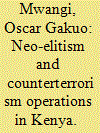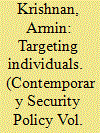| Srl | Item |
| 1 |
ID:
149747


|
|
|
|
|
| Summary/Abstract |
A relative oasis of stability in a troubled region, Jordan is nonetheless contending with multiple internal pressures that could yet destabilise it. Mohammed Najib surveys the security challenges facing the kingdom following the 20 September elections.
|
|
|
|
|
|
|
|
|
|
|
|
|
|
|
|
| 2 |
ID:
151750


|
|
|
|
|
| Summary/Abstract |
Counterterrorism operations in Kenya have often been hindered by a lack of collaboration, coordination and cooperation among the security agencies involved in such operations. This article examines the relationship between neo-elitism and counterterrorism security interagency activity in Kenya. Using neo-elitism as a framework for analysis, with specific reference to the September 2013 Westgate Mall attack counterterrorism operation, it is argued that the lack of collaboration, coordination and cooperation among Kenya’s counterterrorism security agencies often results in unintended adverse consequences. The interagency conflict over the Westgate operation was primarily about command and control, intelligence sharing and official information shared with the public pertaining to the stages of the siege and operation. These security agencies share similar responsibilities and jurisdictions in the rest of the country’s counterterrorism efforts. The interagency conflicts reveal that the country’s security elites pursue personal and agency-specific interests that are aimed at maintaining organisational supremacy over counterterrorism efforts. Recommendations are offered for how to tackle the problem of interagency conflict in order to enhance the effectiveness of counterterrorism operations in Kenya.
|
|
|
|
|
|
|
|
|
|
|
|
|
|
|
|
| 3 |
ID:
122999


|
|
|
|
|
| Publication |
2013.
|
| Summary/Abstract |
Targeted killing is not new. What has changed is the nature of armed conflict, states that openly admit to the practice, and the emergence of much more capable technology. Targeting individuals seems to make sense given the changing nature of armed conflict. But whether targeting dangerous individuals is indeed legal, effective, and ethical is often impossible to determine, either in specific cases or systematically, because of the secrecy surrounding such operations. Calls from civil society and legislatures for greater transparency in targeted killings are unlikely to result in more openness or accountability, easily denied by the precedence of security claims for these intelligence-driven operations and covert actions. This barrier also makes it very difficult to develop consistent domestic and international rules for targeting individuals outside war zones. If states became more transparent about how and why individuals are targeted, the approach could gain more legitimacy. Rather than giving states a blanket legal authority of secretly killing individuals they deem terrorists or threats to national security, a workable solution could be a systematic preference to rely on non-lethal means in targeted counterterrorism operations with the aim of subsequent prosecution of captured individuals. A systematic preference for non-lethality should be accompanied by a requirement for the humane treatment of detained terrorists/combatants and a requirement for a fair trial after a specified period of detention. Secret prisons and indefinite detentions of terrorism suspects not charged with any crime should not be permissible practices in democratic states.
|
|
|
|
|
|
|
|
|
|
|
|
|
|
|
|
| 4 |
ID:
107595


|
|
|
|
|
| Publication |
2011.
|
| Summary/Abstract |
The United States can no longer afford a world-spanning foreign policy. Retrenchment -- cutting military spending, redefining foreign priorities, and shifting more of the defense burden to allies -- is the only sensible course. Luckily, that does not have to spell instability abroad. History shows that pausing to recharge national batteries can renew a dominant power's international legitimacy.
|
|
|
|
|
|
|
|
|
|
|
|
|
|
|
|